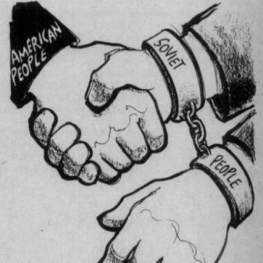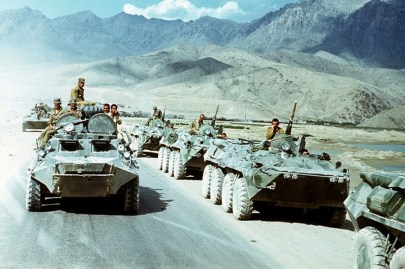
Image from interesting article on détente. Full source information below.
The United States and the Soviet Union have never been best buds. However, the 1970’s brought about a new foreign policy that both the Soviet Union and the United States could get on board with, that of détente. This policy, as described by Gregory Freeze in his book, “Russia a History,” made way for agreements on trade, arms, and human rights (445). The most significant of which were the first and second Strategic Arms Limitation Treaties (SALT). The first of these paved the way for future agreements on nuclear accidents, joint space operations and more (Freeze 445).
The Soviet Union wanted to spread its influence as far as they could, and this meant keeping a close eye on countries in Asia and Africa. Places like Afghanistan, China, and South Yemen were often highlighted in news reports, as linked. After failed attempts at improving relations with China, the Soviet Union shifted its attention to South Yemen, where a 1978 revolution had produced a Marxist republic (von Geldern). Brezhnev, successor to Khrushchev, offered aid in the form of military assistance and arms shipments in an attempt to spread the Soviet Union’s influence. Unfortunately, these efforts weren’t enough to satisfy the Soviet Union, so they invaded Afghanistan on December 25th, 1979; effectively shattering the period of relaxed hostilities between them and the United States.
This invasion, according to the Seventeen Moments of Soviet History subject essay on the matter, indicates that the Soviet Union was invited in by the new Soviet-installed government leader, Babrak Karmal. Karmal had just executed the formerly soviet-friendly leader Nur Mohammad Taraki. Soviet invaders were met by the Mujahideen, an Islamic resistance force that first arose in opposition to the Afghan Communist Party. After ten years of conflict the Soviet Union finally withdrew, as seen below, but the damage to their international relations with other states had already been done.

Sources:
Astrachan, Anthony. “Détente and Dissent.” The New Republic, 22 Sept. 1973, newrepublic.com/article/91476/detente-and-dissent. Accessed 19 Apr. 2018.
The Current Digest of the Russian Press, East View Information Services, dlib-eastview-com.ezproxy.lib.vt.edu/browse/publication/6765?searchLink=%2Fsearch%2Fsimple. Accessed 19 Apr. 2018.
Freeze, Gregory L. Russia: A History. 3rd ed., New York, Oxford UP, 2009.
Von Geldern, James. “Invasion of Afghanistan.” Seventeen Moment in Soviet History, WordPress, soviethistory.msu.edu/1980-2/invasion-of-afghanistan/. Accessed 19 Apr. 2018.
![]() This post was featured in our course blog’s “Comrade’s Corner” chosen by the editorial team.
This post was featured in our course blog’s “Comrade’s Corner” chosen by the editorial team.

I also wrote on the period of detente. Your focus on the Soviet involvement in Afghanistan is a good examination on how the period of detente came to an end. Despite the advancement that had been made in relations between the U.S. and the Soviet Union, the direct opposition between the two in Afghanistan erased this progress. Do you think this period of detente could have continued if the Soviet had never gotten involved in Afghanistan?
LikeLiked by 1 person
Thanks for your feedback! With regard to your question, in my opinion the United States and the Soviet Union were never going to be bffs and the period of detente was bound to end regardless of the invasion of Afghanistan.
LikeLike
Terrific title! Detente is such an important topic, and I like the way you have contextualized the invasion of Afghanistan into the broader context of the Brezhnev doctrine. Those Soviet press articles are really interesting — they address such a range of issue – de-colonization in Yemin, the controversies around the “Gang of Four” in China, and the Taraki regime’s early initiatives….which on the face of it sound pretty progressive:
“A draft law is in preparation that bans early marriages and polygamy. Until now men could unilaterally declare their wives divorced, deprive them of the right to keep their children, and leave them without any means of existence. This will now be stopped. Laws will be passed making women equal to men in questions of hiring and wages.”
Not sure I see the connection between Yemen and the Soviet invasion of Afghanistan? Or am I not reading your post correctly?
LikeLike
My brief discussion of Yemen was an effort to show the Soviet Union’s attempt to spread their influence before the Invasion of Afghanistan.
LikeLiked by 1 person
Great post! It’s amazing to read about what lengths the Soviet Union was willing to go to in order to spread their influence. Their desire to do so, ultimately hurt their foreign relations and limited their sphere of influence. I guess this shows that force isn’t the best way to get your point across.
LikeLiked by 1 person
Great post! The increased negotiation between the United State and the Soviet Union really was the biggest achievement during detente. While detente meant an easing of tensions between the two superpowers, the United States and the Soviet Union were still eager to expand their influence at the expense of the other. Great links to the Current Digest as well!
LikeLiked by 1 person
The Soviet invasion of Afghanistan not only caused distress in the region but had long-lasting effects that we are still dealing with today. For example, as we all know the U.S. and Russia have never been on as good talking terms as they were during détente, not only that but the resistant fighters we created during the conflict end up attacking up on 9/11. Leading to our own invasion and partial occupation of Afghanistan. Do you think that if we didn’t help the Mujahideen, that the Soviets would have still left Afghanistan?
LikeLike
In all honesty I am not sure, but my best guess would be that they would not have left Afghanistan had we not helped the Mujahideen because their chances of success would be increased.
LikeLike
Great post on the invasion of Afghanistan and Detente. A fun fact I learned after reading more about the invasion is that the United States boycotted the summer Olympics in Moscow. How much do you think the new presidential administration in the United States (Reagan) contributed to the move away from detente?
LikeLike
I’m not sure, but thank you for bringing this up! I will have to look into it!
LikeLike
With the threat of a counterinsurgency against the Communist Party in Afghanistan, the Russian government thought it was important that they display their power and party importance through their presence. Looking back at the conflict now and how the Soviet Union handled this, do you think they should have still invaded or stayed abroad?
LikeLike
In my opinion they didn’t get much out of the invasion and probably would have been better off had they not invaded. Certainly their relations with western countries would have been better.
LikeLike
I wasn’t aware that the Soviets spent an entire 10 years in Afghanistan while pursuing influence into these third world countries. This displays how determined the Soviet Union was to spread themselves into third world countries. What lessons do you think the United States could have taken out of this?
LikeLike